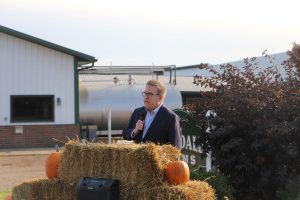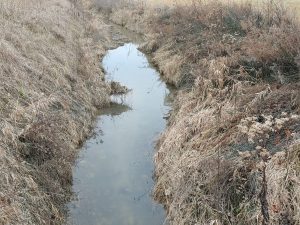Conservation, Homepage Slider, Soybean Quality, Water Quality
A Common-Sense Approach to Regulations
By Dusty Sonnenberg, CCA, Ohio Field Leader: a project of the Ohio Soybean Council and soybean checkoff.
All too often the words “common sense” and “environmental regulations” have not been used in the same phrase when it comes to the Environmental Protection Agency (EPA). Andrew Wheeler, Administrator for the US EPA wants to change that perception. A native of Fairfield, Ohio, Administrator Wheeler recently visited Clardale Farms just outside of Canal Fulton. He was hosted by the Frank Burkett family. Burkett is the current President of the Ohio Farm Bureau Federation. While there, Administrator Wheeler toured the farm and shared comments regarding the US EPA and a number of issues pertinent to agriculture.

“I hope you have seen in this administration, a change in the way that the EPA is working with the agriculture community,” said Wheeler. “I want to work cooperatively with farmers. Farmers are the first environmentalists and conservationist. We want to be a partner. We want the same things you want. The mission of the EPA is to protect human health and the environment. Agriculture has a mission to provide people with food and protect the environment at the same time. Agriculture needs to do both at the same time, or there will not be a farm for the next generation. A lot of people in Washington D.C. don’t understand that.”
Wheeler pointed to changes in the Waters of the United States (WOTUS) interpretations, and the common sense approach this administration has taken. “The previous administration issued their WOTUS rule, and by their definition, it would have forced 98% of the state of Iowa to be under federal jurisdiction according to the Iowa Secretary of Agriculture. Missouri would have 94-95% of the state under federal jurisdiction, and it was similar across the entire country. As a result, it got held up in the courts,” said Wheeler. “We came in and looked at the issue and looked at what the law says, and what the courts told us to do. The writers of the original clean waters act in the 1970’s interpreted navigable waters as water you could put a boat on and navigate. It has been expanded over the years, and three different Supreme Court Cases since that time have changed the definition. We are required to take a look at what the law says, and the Supreme Court Cases. We came up with what I believe is a workable definition of the Waters of the U.S.”
Wheeler pointed out specific examples of what this change in the WOTUS definition means. “We, for the first time, differentiated what federal waterways are and what state waterways are. I told my staff from day one, that I want a farmer or property owner to be able to stand on their property and be able to tell for themselves what the definition of a federal waterway is without having to hire a lawyer or consultant to tell them. That is the transparency the government should be providing to the tax payers. We defined that most roadside ditches and farm ditches are no longer considered waters of the U.S. We said that farm ponds are not waters of the U.S. and prior converted croplands are not considered waters of the U.S. I want to make sure that all the inspectors across the country are using the exact same guidelines and exact same definitions.”
Pesticide regulations, especially regarding the use of dicamba products, have been an area of contention across the country. “There are a lot of court decisions out of California that end up applying nationwide,” said Wheeler. “There was a California Court decision in June revoking the registration for dicamba. I went ahead and extended the use of those dicamba products until the end of July. I thought that was fair since many farmers already had it on their farms. We now have applications for reregistration for the dicamba products from two of the manufacturers. It is going through the process at the agency. We hope to have a decision in about two weeks whether or not to grant the registration for the 2021 growing season. We need to make sure we go through all the science to ensure it is safe to use with the appropriate restrictions, or we know it will immediately be overturned by the 9th Circuit California Court. I also know we need to make a decision soon so farmers can count on it one way or the other. I cannot tell you which way it will be decided until I review the science, but I can assure you that you will have a decision either way so that you have clarity going into the 2021 growing season.”
Wheeler concluded his comments looking toward the future. Water for the 21st century is a priority. “I don’t think that climate change is the biggest environmental issue facing the planet today. I think water is. When we have 1,000 children dying worldwide every single day due to a lack of clean drinking water, and that is a crime,” said Wheeler. “We know what the technologies needed are, and it is just a matter of proper funding. Countries all over the world are focusing on climate change, and ignoring the fact that we have 1,000 children dying every single day from a lack of clean safe drinking water.”
Another priority issue to be addressed is a wholistic approach to pesticide management. “I want to address this, and I need your help,” said Wheeler. “We do a very good job at the EPA of registering pesticides. We do a good job approving the labels and explaining them to the users how they should be used. What we do not do a good job of is explaining to the American public what we do with pesticides, and the relative safety of pesticides. We at the EPA need to explain to the American public what we do when we review a pesticide, and all the work and scientific studies we review to determine if a pesticide is safe. I want to work with agriculture and the national organizations to do a better job explaining to the American public what we do with pesticides to ensure they are safe for the farmers and applicators, and to the water they drink, and the food that is produced and consumed.”